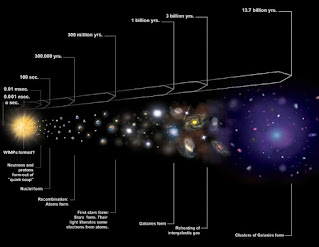Dark matter & Dark energy
Dark matter is a type of matter that is thought to make up about 27% of the total mass and energy in the universe, but it does not interact with light or other forms of electromagnetic radiation in any significant way, which makes it difficult to detect. Dark matter is believed to be composed of exotic particles that do not fit into the standard model of particle physics. Scientists infer the existence of dark matter because of the gravitational effects it has on visible matter, radiation, and the large-scale structure of the universe, but the nature of dark matter is still largely unknown and is one of the biggest mysteries in modern physics.
Dark energy is a hypothetical form of energy that is thought to be responsible for the acceleration of the expansion of the universe. It is believed to make up about 68% of the total mass and energy in the universe, and it is often referred to as the "cosmological constant," which was first proposed by Einstein as a way to explain the observed expansion of the universe.
However, the nature of dark energy is not well understood, and it is one of the most mysterious and least understood aspects of the universe. Some scientists believe that dark energy may be a property of space itself, while others think it may be related to a new field or force that has not yet been discovered.




0 Comments:
Post a Comment
Subscribe to Post Comments [Atom]
<< Home